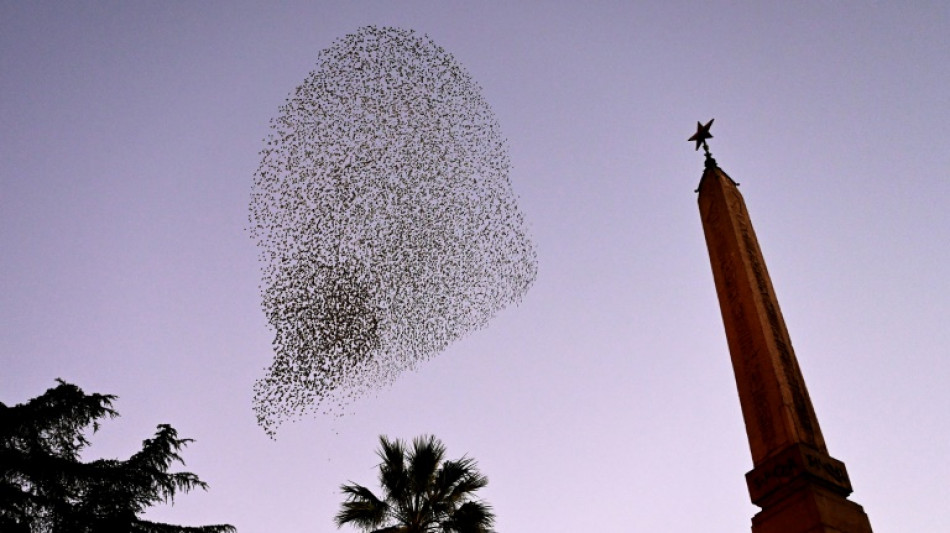
-
 Yesavage fairytale carries Blue Jays to World Series brink
Yesavage fairytale carries Blue Jays to World Series brink
-
Bank of Japan keeps interest rates unchanged

-
 Impoverished Filipinos forge a life among the tombstones
Impoverished Filipinos forge a life among the tombstones
-
Jokic posts fourth straight triple-double as Nuggets rout Pelicans

-
 UN calls for end to Sudan siege after mass hospital killings
UN calls for end to Sudan siege after mass hospital killings
-
Teenage Australian cricketer dies after being hit by ball

-
 As Russia advances on Kupiansk, Ukrainians fear second occupation
As Russia advances on Kupiansk, Ukrainians fear second occupation
-
Trade truce in balance as Trump meets 'tough negotiator' Xi

-
 China to send youngest astronaut, mice on space mission this week
China to send youngest astronaut, mice on space mission this week
-
Yesavage gem carries Blue Jays to brink of World Series as Dodgers downed

-
 With inflation under control, ECB to hold rates steady again
With inflation under control, ECB to hold rates steady again
-
Asia stocks muted with all eyes on Trump-Xi meeting

-
 Personal tipping points: Four people share their climate journeys
Personal tipping points: Four people share their climate journeys
-
Moto3 rider Dettwiler 'no longer critical' after crash: family

-
 US economy in the dark as government shutdown cuts off crucial data
US economy in the dark as government shutdown cuts off crucial data
-
Trump orders nuclear testing resumption ahead of Xi talks

-
 'Utter madness': NZ farmers agree dairy sale to French group
'Utter madness': NZ farmers agree dairy sale to French group
-
Samsung posts 32% profit rise on-year in third quarter

-
 30 years after cliffhanger vote, Quebec separatists voice hope for independence
30 years after cliffhanger vote, Quebec separatists voice hope for independence
-
Taxes, labor laws, pensions: what Milei wants to do next

-
 South Sudan's blind football team dreams of Paralympic glory
South Sudan's blind football team dreams of Paralympic glory
-
US says 4 killed in new strike on alleged Pacific drug boat

-
 What we do and don't know about Rio's deadly police raid
What we do and don't know about Rio's deadly police raid
-
'They slit my son's throat' says mother of teen killed in Rio police raid

-
 Arteta hails 'special' Dowman after 15-year-old makes historic Arsenal start
Arteta hails 'special' Dowman after 15-year-old makes historic Arsenal start
-
Google parent Alphabet posts first $100 bn quarter as AI fuels growth

-
 Underwater 'human habitat' aims to allow researchers to make weeklong dives
Underwater 'human habitat' aims to allow researchers to make weeklong dives
-
Maresca slams Delap for 'stupid' red card in Chelsea win at Wolves

-
 'Non-interventionist' Trump flexes muscles in Latin America
'Non-interventionist' Trump flexes muscles in Latin America
-
Slot defends League Cup selection despite not meeting 'Liverpool standards'

-
 'Poor' PSG retain Ligue 1 lead despite stalemate and Doue injury
'Poor' PSG retain Ligue 1 lead despite stalemate and Doue injury
-
Liverpool crisis mounts after League Cup exit against Palace

-
 Kane scores twice as Bayern set European wins record
Kane scores twice as Bayern set European wins record
-
Radio Free Asia suspends operations after Trump cuts and shutdown

-
 Meta shares sink as $16 bn US tax charge tanks profit
Meta shares sink as $16 bn US tax charge tanks profit
-
Dollar rises after Fed chair says December rate cut not a given

-
 Google parent Alphabet posts first $100 bn quarter as AI drives growth
Google parent Alphabet posts first $100 bn quarter as AI drives growth
-
Rob Jetten: ex-athlete setting the pace in Dutch politics

-
 Juve bounce back after Tudor sacking as Roma keep pace with leaders Napoli
Juve bounce back after Tudor sacking as Roma keep pace with leaders Napoli
-
Favorite Sovereignty scratched from Breeders' Cup Classic after fever

-
 Doue injured as PSG held at Lorient in Ligue 1
Doue injured as PSG held at Lorient in Ligue 1
-
Leverkusen win late in German Cup, Stuttgart progress

-
 Jihadist fuel blockade makes life a struggle in Mali's capital
Jihadist fuel blockade makes life a struggle in Mali's capital
-
Uber plans San Francisco robotaxis in Waymo challenge

-
 Paramilitary chief vows united Sudan as his forces are accused of mass killings
Paramilitary chief vows united Sudan as his forces are accused of mass killings
-
Trump, Xi to meet seeking truce in damaging trade war

-
 Divided US Fed backs second quarter-point rate cut of 2025
Divided US Fed backs second quarter-point rate cut of 2025
-
'Amazing' feeling for Rees-Zammit on Wales return after NFL adventure

-
 'Cruel' police raids help, not hinder, Rio's criminal gangs: expert
'Cruel' police raids help, not hinder, Rio's criminal gangs: expert
-
S. African president eyes better US tariff deal 'soon'


Magical but messy: Rome scares off its starlings
As the sun sets over central Rome, five figures in white overalls move under the trees. They wave speakers emitting a mix of sharp cries, and the birds rise into the air.
Every winter, the skies over Italy's capital are filled with the mesmerising sight of thousands of starlings swooping and diving in unison.
But when they stop to rest on the trees, their droppings coat the pavements and cars below -- prompting the city authorities, every year, to try to scare them away.
"We act on their fear reflex by using their own alarm call," said Marianna Di Santo, clad head-to-toe in white protective clothing and heading towards the birds gathered in trees around Termini central train station.
"It's as if they were warning each other that this is a dangerous place and they should move away," said Di Santo, whose company, Fauna Urbis, is hired by the Rome authorities to disperse the starlings.
- Up to one million -
Between October and February every year, millions of starlings migrate from northern Europe to Italy in search of warmer temperatures for the winter.
Their synchronised ballets -- murmurations -- over the Eternal City's centuries-old churches, palaces and ruins entrances passers-by.
"I've never seen such a thing in my life. It's spectacular," said Spanish tourist Eva Osuna, taking out her phone to capture the magic.
The glossy dark-feathered birds, which measure up to 20 centimetres each, spend the day feeding in rural areas before heading back into town to sleep, explains ornithologist Francesca Manzia from Italy's League for Bird Protection (LIPU).
"In the city, the temperatures are higher and the light helps them find their way around, and protects them from predators," she told AFP.
Warmer temperatures in northern European caused by climate change have shortened the starlings' stay in Italy, but their sheer numbers make them a force to be reckoned with.
Between 500,000 and one million are believed to be in Rome this year, according to one expert.
Naturally "gregarious", according to Manzia, they stick together at night, creating collective dormitories in the trees.
She insisted the starlings "do not carry diseases" but pose problems "because of their droppings, which make the roads slippery and smell very strong".
- In their nature -
Such is the problem that, even on a clear day, it is not uncommon to see Romans walking along tree-lined streets with umbrellas as protection against the birds.
City authorities use sounds and also lights not to chase the birds out of the city, but to split them up into smaller, more manageable groups.
Sounds are "the most simply and effective" way of moving the birds on, said Valentina de Tommaso from Fauna Urbis.
She works two or three times a week near Termini, which -- with its lights and shelter from the wind -- is a "comfortable" place for the birds to rest.
"We play recordings for about 10 minutes, with breaks in between so they do not get used to the noise" -- a tactic that aims to be annoying but harmless, she said.
The piercing noise draws a small crowd, some of them approving, others less so.
"They pose lots of problems. Walking around under flocks of starlings is not really ideal," said Francesco Fusco, a 55-year-old engineer.
"It's in their nature. We are not going to make them wear nappies!" he said, laughing.
L.Dubois--BTB




